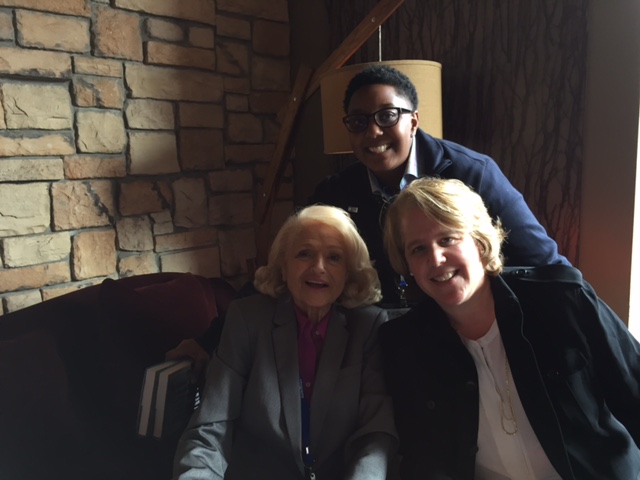TGIF
TGIF
TGIF
The Weekly Grind
TGIF
Nothing is worst than claiming to be an expert recruiter or staffing partner in a specific field and having no network or pipeline to back that up. It really is embarrassing and the rest of us are just shaking our heads at you. When you or your company are selling yourself as a  “leader in IT staffing” and your client request an application architect, you should be able to deliver that over night. If not, it is probably because your pipeline sucks. Or you are just trying to grow market share without actually having the product or service to deliver on fluffed promises. Either way, when it takes you 7 to 10 days to deliver your first mediocre candidate, it’s not a good look.
“leader in IT staffing” and your client request an application architect, you should be able to deliver that over night. If not, it is probably because your pipeline sucks. Or you are just trying to grow market share without actually having the product or service to deliver on fluffed promises. Either way, when it takes you 7 to 10 days to deliver your first mediocre candidate, it’s not a good look.
What is a pipeline? It’s a complex answer and solely depends on who you ask. Some agencies or corporations will tell you that a pipeline is a database full of candidates that you can call and at a moments notice those candidates will drop what they are doing and go to work for you right away! After all, they are in your super-duper one of a kind database. Now let’s move on through my sarcasm and talk about a real pipeline. A pipeline should be candidates that you have a relationship with that goes beyond a LinkedIn profile. These should be candidates that you have talked to or at least corresponded with via email or social tool.These could be candidates that your company or peers have a good relationships with and are accessible to you also. Most of your “pipeline” should be pre-identified and have been through part of your vetting process if not all of it.
 For the sake of this demonstration, let’s say you have determined that you do not have a good pipeline, how do you fix this? First, you want to identify your top skill sets, or most repeatable ones. Second, you want to dedicate time in your day to connecting with professionals in those skill sets, even if you don’t have an open requisition. These are the people who you want to always be connecting with and engaging in meaningful conversation. You want to become a trusted resource, so that once a professionals decides to put themselves out in the job market, they reach out to you. Third, you want to start keeping track of these candidates in a database, ATS, CRM, Excel Sheet, or something similar. You will need to organize your pipelines by skill set and level (example: mid level java developers and senior level java developers). At any given time you want to have 25-40 people in your pipeline that are available or at least would want to hear about an opportunity from you (40-50 if you are recruiting non IT or engineering positions).How on earth will you manage that many contacts? With technology of course! Which brings us to the fourth step, also know as: Follow-up. You will want to set reminders in your email or calendar client to follow-up with pipeline candidates. Leave good follow-up notes and dates in your ATS or CRM tool. Pay attention to LinkedIn updates and job changes. Make sure you engage and acknowledge those moments with you members of your pipeline. Lastly, you will want to network with your pipeline to further grow it. What better way to find Java Developers than through other qualified Java Developers. #worksmarternotharder #RoztheRecruiter
For the sake of this demonstration, let’s say you have determined that you do not have a good pipeline, how do you fix this? First, you want to identify your top skill sets, or most repeatable ones. Second, you want to dedicate time in your day to connecting with professionals in those skill sets, even if you don’t have an open requisition. These are the people who you want to always be connecting with and engaging in meaningful conversation. You want to become a trusted resource, so that once a professionals decides to put themselves out in the job market, they reach out to you. Third, you want to start keeping track of these candidates in a database, ATS, CRM, Excel Sheet, or something similar. You will need to organize your pipelines by skill set and level (example: mid level java developers and senior level java developers). At any given time you want to have 25-40 people in your pipeline that are available or at least would want to hear about an opportunity from you (40-50 if you are recruiting non IT or engineering positions).How on earth will you manage that many contacts? With technology of course! Which brings us to the fourth step, also know as: Follow-up. You will want to set reminders in your email or calendar client to follow-up with pipeline candidates. Leave good follow-up notes and dates in your ATS or CRM tool. Pay attention to LinkedIn updates and job changes. Make sure you engage and acknowledge those moments with you members of your pipeline. Lastly, you will want to network with your pipeline to further grow it. What better way to find Java Developers than through other qualified Java Developers. #worksmarternotharder #RoztheRecruiter
If you have questions or comments about this topic, please email them to roslinh@roztherecruiter.com or tweet me @roztherecruiter
 After listening to Tiffany Dockery speak at the Lesbians Who Tech Summit, I have spent a lot of time reflecting on an inadequate feeling know as “Impostor Syndrome.” According to Wikipedia, Impostor syndrome (also spelled imposter syndrome, also known as impostor phenomenon or fraud syndrome) is a term coined in 1978 by clinical psychologists Dr. Pauline R. Clance and Suzanne A. Imes referring to high-achieving individuals marked by an inability to internalize their accomplishments and a persistent fear of being exposed as “fraud”. Now that is DEEP!
After listening to Tiffany Dockery speak at the Lesbians Who Tech Summit, I have spent a lot of time reflecting on an inadequate feeling know as “Impostor Syndrome.” According to Wikipedia, Impostor syndrome (also spelled imposter syndrome, also known as impostor phenomenon or fraud syndrome) is a term coined in 1978 by clinical psychologists Dr. Pauline R. Clance and Suzanne A. Imes referring to high-achieving individuals marked by an inability to internalize their accomplishments and a persistent fear of being exposed as “fraud”. Now that is DEEP!
I have found myself, on more than one occasion feeling this way. As recently, as 5 months ago I started to deal with this exact feeling. I keep thinking “what If I am not as good of a recruiter as they think I am”, and “what if I don’t know what I am doing and they find out.” Despite trying to come off extremely confident for my employer, peers, and client, I was terrified internally. I wasn’t sharing this feeling with anyone, and started to be a real downer. Finally, I started to confide in a mentor of mine and he was able to reiterate my success and validate my abilities, but most importantly he told me to stop doubting myself. Everyone else knew my abilities and valued my strengths, the problem was with me. It was in that moment, that I started to turn around and realize that I am not stupid and do know what I am doing.
Fast forward 6 months and my mentor was having the exact same issue and was venting to me! Thank goodness it was after Tiffany’s presentation, because I knew just what to say and was able to identify that he was dealing with “Impostor Syndrome.” More than likely you or someone you know will go through this as well. The most common trait of that I have noticed is when someone starts apologizing for every little thing. Being asked a simple question like “Hey John, did you send me that presentation?” If John is battling impostor syndrome he may answer like this, “Oh, I’m so sorry, I haven’t sent it yet.” Why is he sorry? A simple “No, I haven’t sent it yet, I will get it out by noon,” would have sufficed. Another thing I have noticed is that people dealing with this may stop speaking up. They may become quiet in peer meetings and you will notice that they stop offering up their ideas. These are just a couple common signs that they may be feeling inadequate.
Who is affected by this overwhelming feeling? The impostor syndrome is particularly common among high-achievers. That’s right… high achievers! The cream of the crop is most affected by this madness. For companies that are sales driven and very progressive with performance management, I would suggest tackling this issue early on with your employees. Another demographic group that often suffers from this phenomenon are minorities (specifically African Americans and Mexican Americans). Being the beneficiary of affirmative action may cause a person who belongs to a visible minority to doubt their own abilities and suspect that their skills were not what allowed them to be hired.
Most people who experience impostor syndrome are unaware that others feel inadequate  as well. Imagine how shocked I was to hear my mentor doubting himself? I had no idea that he felt inadequate and he was able to get vulnerable with me. The most prominent way to manage imposter syndrome is to discuss the topic with other individuals early on in the career path. Get a mentor! And Become a mentor! Mentors can discuss experiences, where impostor syndrome was prevalent. Clear your mind and take time to think. Reflecting upon impostor feelings is key to overcoming this burden. Make a list of accomplishments, positive feedback and success stories will also aid to manage impostor syndrome. Finally, developing a strong support system, that provides feedback on performance and has discussions about imposter syndrome on a regular basis is imperative for those experiencing inadequate feelings.
as well. Imagine how shocked I was to hear my mentor doubting himself? I had no idea that he felt inadequate and he was able to get vulnerable with me. The most prominent way to manage imposter syndrome is to discuss the topic with other individuals early on in the career path. Get a mentor! And Become a mentor! Mentors can discuss experiences, where impostor syndrome was prevalent. Clear your mind and take time to think. Reflecting upon impostor feelings is key to overcoming this burden. Make a list of accomplishments, positive feedback and success stories will also aid to manage impostor syndrome. Finally, developing a strong support system, that provides feedback on performance and has discussions about imposter syndrome on a regular basis is imperative for those experiencing inadequate feelings.
There are so many articles and reports on impostor syndrome. Please remember, you are not alone, and you are such a badass at what you do, that its common to feel a little inadequate under all that awesome! You are amazing and don’t you forget it! Follow me on twitter for more information on Impostor Syndrome! @Its_Rozi
 I had an amazing time at the 3rd annual Lesbians Who Tech Summit in San Francisco. Women from all over came together at the Castro Theater to share their common interest of Technology. Prior to this event, I thought I was a pretty good networker, but this event was networking on steroids. Women from all levels in their career were in attendance. College student to executive leadership, all on the same playing field. Everyone had access to everyone. There were no imaginary boundaries and nothing was off limits. It was like a giant Tech Conference/ Urban party. There was music, dancing, start-up pitches, Converse, and amazing hair styles.
I had an amazing time at the 3rd annual Lesbians Who Tech Summit in San Francisco. Women from all over came together at the Castro Theater to share their common interest of Technology. Prior to this event, I thought I was a pretty good networker, but this event was networking on steroids. Women from all levels in their career were in attendance. College student to executive leadership, all on the same playing field. Everyone had access to everyone. There were no imaginary boundaries and nothing was off limits. It was like a giant Tech Conference/ Urban party. There was music, dancing, start-up pitches, Converse, and amazing hair styles.
Lesbian’s Who Tech was probably one of the best recruiting tech conferences I have EVER been too! Last year, BuzzFeed did a review of the conference and said “If every tech conference were like Lesbians Who Tech, Tech would be a much better place.” After attending this year, I would have to agree. It was simply amazing. I was so proud of our community and the responsibility we are taking for ourselves and others.
Sessions weren’t just technical, they were emotional, others focused on soft skills and self development and some were loud and in your face on issues of inequality within intersectionality within the community. The organizations founder really won my respect when she stood on stage and said that LGBT people of color, and racial inequality needed to become part of the gay agenda. These women impressed me with their technical expertise and their desire to open doors for more women just like me.
I was really proud of the tech companies that showed up to support and recruit talent at this years event. Google, Twitter, IBM, Yelp, and Amazon were some of the more recognizable names and sponsors of the event. When the Silicon Valley announced that they had an issue with hiring, developing, and retaining women in the tech industry, I was concerned that little would be done, but to see all of these companies show up at a Lesbian tech conference, gave me a little hope that doors were being opened for us.
There were so many great speakers. I will try to share a few that really stood out to me. A speaker named Perry Eising talked about “No Experience Necessary” and Perry’s mother’s journey to entering the tech world as a computer operator, because she saw an ad that said “no experience necessary.” Later, they talked about Perry’s mother landing a job with IBM as a programmer. They shared moments of her mother continuing to learn new skills on the job and working really hard to continue learning. Perry credited their mother with installing a passion for technology and teaching others without experience or formal training. Perry is an instructor at Epicodus where they teaching coding to adults with no experience.

Tiffany Dockery of Amazon spoke on How to Overcome Imposter Syndrome. This was a very powerful message and ended with a standing ovation. Tiffany touched on a feeling that many of us have once we are hired with a progressive tech company we start to self doubt and feel less than worthy. She made sure to let the audience know they
were worthy and even had them recite that a couple times. What was powerful about Tiffany’s presentation was how easy it was to relate to her. You felt like Tiffany was one of your friends and she immediately made you feel safe and comfortable with her. She carefully crafted with words and slides to empower you. She reveled that most of the time these negative thoughts are being place in our heads, by ourselves, but we aren’t alone in this. She recommended being kinder to ourself, seeking a mentor and being a mentor to someone else. She gave the audience a prayer by Sarah Hagi, to help women gain their confidence. “Lord give me the confidence of a mediocre white man.” She was absolutely a conference favorite.

My favorite session during the event was none other than Edie Windsor’s live interview. If you don’t know who Edie Windsor is, I will let Wikipedia give you a quick overview. According to Wikipedia, she is an American lesbian, gay, bisexual and transgender (LGBT) rights activist and a former technology manager at IBM. She was the lead plaintiff in the Supreme Court of the United States case, United States v. Windsor, which successfully overturned Section 3 of the Defense of Marriage Act and was considered a significant legal victory for the same-sex marriage movement in the United States. I personally credit Edie Windsor for taking on the fight that lead to myself and millions more being able to share the same civil liberty to marry as most of our friends, family, and co workers. Edie shared the stage with her attorney Roberta Kaplan. Roberta shared her coming out story and the story of how she met Leah and Edie. Edie shared tidbits of her amazing love story, her time at IBM, and the defeat of DOMA. I fell even more in love with her. After Edie’s live interview, I had the opportunity to spend one minute with her and Roberta Kaplan during the book signing. Edie was all smiles, I thanked her for her fight that allowed me to have this freedom. I told her that I was proud to be an IBMer like her. At that moment, her eyes watered and she kissed my hand. She told me that she was proud of me and that she loved IBM.
IBM is a partner sponsor of Lesbians Who Tech and that makes me very proud to be a part of this amazing company. Kimberly Messer, who is the Business Development Executive for LGBT for North America ran point with making sure that IBMers took part in this event. She also lead a break out session on the Importance of Soft Skills in a super Techy world. Joanna Pena-Bickley, Creative Officer, IBM Interactive Experience, was so amazing on stage when speaking about the advancements that Watson has made and how he will super charge humans in the fields of Technology, Medicine, Automotive, and so many more. I met so many Lesbian and Queer women who worked at IBM as an intern, professional, management, and executive level roles. We all were connecting because of our love of technology and the connection of our community. IBM constantly encourages this and goes out of its way to make sure that we have out women in leadership and strong pipelines of LGBT talent. I am very proud to have attended this event and represented IBM. I truly am proud to be a apart of the LGBT community and proud to be an IBMer.
If you are Lesbian, a Queer Woman, or an Ally, I encourage you to attend a summit. Please visit lesbianswhotech.org to find out more about the organizations and how you can attend and participate.
Compensation can be a touchy subject for all parties involved during the recruitment process. To some folks, it can be the most nerve wrecking part of the hiring process. If you are a candidate, you are concerned that what you request may be too low and under value you own experience or its too high an may take you out of consideration. You are probably also afraid of getting low balled by some recruiters. If you are a recruiter, you probably are afraid that your perfect candidate is going to be out of your pay range and than its back to square one. Or worst they try to re negotiated every step of the way. From my experiences the best approach is the simplest approach. Just be straight forward and transparent.
process. To some folks, it can be the most nerve wrecking part of the hiring process. If you are a candidate, you are concerned that what you request may be too low and under value you own experience or its too high an may take you out of consideration. You are probably also afraid of getting low balled by some recruiters. If you are a recruiter, you probably are afraid that your perfect candidate is going to be out of your pay range and than its back to square one. Or worst they try to re negotiated every step of the way. From my experiences the best approach is the simplest approach. Just be straight forward and transparent.
For HR departments – Compensation needs to be simplified and consistent across your operating company. It is probably best to hire a third party firm to perform a compensation analysis on your job titles, salary bands, levels, years of experience, geographical market, and existing workforce. If you set titles, requirements, and salary bands, this will help make the candidate experience pleasant for job seekers, remember this part of the process will impact your number of hires and reputation in the market place.
For Job Seekers – Before you hop in the job market you need to have an understanding of your own experience and what compensations comes with that. More often than not, candidates overprice themselves, because they “know someone” in the same field making twice as much as they are or because their stock options are so much greater. Thats bad practice and probably won’t really help you get a job. Think of it this way, if you are a passive job seeker (not looking to leave your current job) and a recruiter is trying to convince you to leave your current role with a competitive offer for a lateral position, you can expect a salary increase to be 10 to 15% more than what you are making now. If it is a promotion you can expect that to be 15 to 20%. Now on the flip side if you are successful and showered with hundreds of RSUs and ridiculous bonuses chances are you aren’t leaving your position for compensation, so you need to put a value on what you bring and be ready to walk away from some of that extra stuff. You need to really figure out why you are looking for a change, unless of course finding a new job is mandatory. If its about the work and advancement than you have to find a number that you are comfortable with. My advice is to look at your total compensation and compare it to the package that you are being offered. Be sure to look at all of your “guaranteed” money and not money tied to stock or company performance. If you have an offer from a competitor, let your recruiter know, chances are they will try to beat that offer. This will only help you.
For Recruiters – This is where we give ourselves a bad name and come off very shady or as they say on social media “shady af.” We really need to stop playing the compensation game and get it together. I am going to break this down to speak to a couple different audiences in our community.
Agency Recruiters – Figure out how you are going to get paid from filling this requirement. Are you going to be working on a mark-up or a bill rate? Make sure you look at your cost associate with filling the position (your burden). Do a compensation analysis on the req to understand what candidates should be making in your market at the right level of experience. Find a range that you and your client are comfortable with and then go recruit. If your range is $50-$70 per hour, have an identified a qualified candidate, ask them what their compensation expectation is NOT what they are making currently. If the candidate is out of your range, explain that to them and let them know. Explain why they don’t fit based on salary, however, let the candidate pull themselves out of the running or decided if your opportunity is worth the decrease in pay. Remember, you don’t know their situation, but if they are willing to move forward, proceed with caution. You should be talking them out of the job every step of the way. Make sure they want it and will accept an offer or you will be faced with an unhappy client.
Corporate Recruiter – Understand your salary band and requirements for the position you are working. Let the candidate know upfront what your range is and what the total compensation looks like. Don’t wait until an offer comes before you discuss compensation with candidates. Make sure you have given the candidate a fair and complete look into what the salary structure is for the position you are recruiting them for including any bonus, stock options, long term incentives, and/or medical benefits. Let your candidates make an educated decisions, they will love you for it in the end and probably have a future referral for you.
Compensation conversations are not so bad. They really are not as difficult to discuss if you are using a clean and ethical approach. Don’t be like a used car salesman (no shade there, I use to be one), just be a good and honest recruiter.

Why is IT or Engineering recruiting so difficult? Why is it so intimidating to recruit these skill sets? It isn’t, you are just making it harder than it needs to be. Most of the struggles that I hear from technical recruiters are self-inflicted. Most technical recruiters greatest mistake is that they assume that they need to be experts in the IT or Engineering fields they are recruiting for. WRONG! Let’s be real unless you are about to go back to school and study Computer Science, you are not going to be an expert. Stop kidding yourself and stop trying to fool your client and candidates like you are an engineer. This will only make it more difficult to gain their trust. While you don’t need to be an expert with the technologies, you do need to have an understanding of the industry, technology trends, supply and demand, and your client. If you don’t know your client and the department/business unit you are supporting, you can hang it up, you will never find what they are looking for.
In most cases, I find that recruiters don’t ask the right questions. You can take a consultative approach (big picture, overview, and business strategy) to better qualifying your clients need or you can take a transactional (one req at a time) approach. Either way you need to get the right information to fill the requirement. Try to understand what your client trying to accomplish. These questions have served me well in IT. Is this a new product/software or an existing? What will this product/software do for the company? What will it do for the market? Once you understand the outcome, try to evaluate the environment. What previous experience will make someone successful in this role? What kind of experiences would make someone crash and burn in this role? What skills does this person need to come to the table with? What can you afford to teach this person on the job? How experienced does this person need to be? Can education be in lieu of experience (or vice versa)? These questions along with a good job description often give me what I need to fill the requirement.
Supply and Demand. This is very important in today’s market. How does this factor into how you recruit? Let’s say there are only 10 engineers with a CISSP and 50 job openings for engineers with a CISSP. How difficult do you think it will be to hire 1? This is supply and demand. You need to understand how many qualified candidates there are for your openings and where to find them. My favorite partners for supply and demand tools and data are Career Builder and Wanted Analytics.
If you are a technical recruiter, you need to take an interest in technology. Follow your clients on linkedin.com. Follow a few tech blogs like CNET, Engadget, Mashable, Gizmodo or Inside Tech. If you don’t take an interest chances are you won’t be a technical recruiter for that long.
For more info on being a successful technical recruiter follow the blog or email your questions to roztherecruiter@gmail.com.
 This is not just a recruiting blog. I can’t stress that enough to you. My goal is to not get pigeonholed into one box, but rather serve many communities within human resources and business operations. I will share “recruiting” industry related material, but we are also going to branch out a little, break out of our full cycle boxes, and see what else is out there. I want to explore more than just filling requirements. I plan to really explore the benefit of having a strong diversity and inclusion initiative and its impact on a workforce. Eventually I will touch on organizational development, compensation, the evolution of the recruiter, the importance of reporting and analytics and much, much more. And that’s way more than just recruiting.
This is not just a recruiting blog. I can’t stress that enough to you. My goal is to not get pigeonholed into one box, but rather serve many communities within human resources and business operations. I will share “recruiting” industry related material, but we are also going to branch out a little, break out of our full cycle boxes, and see what else is out there. I want to explore more than just filling requirements. I plan to really explore the benefit of having a strong diversity and inclusion initiative and its impact on a workforce. Eventually I will touch on organizational development, compensation, the evolution of the recruiter, the importance of reporting and analytics and much, much more. And that’s way more than just recruiting.
Every now and then you may see updates on new legislation that may have an impact on the industry. Don’t be surprise if you see recruiting jokes, memes, and hilarious recruiting videos. After all, we know that there is never a dull moment in the life of a recruiter. There will also be best practices shared, guest bloggers and contributors, give aways, and meet-ups.
I will keep a comment section open so that we can share thoughts, ideas, and commentary with Recruiters, HR practitioners, Account Managers, Sales Managers, Coordinators, Job Seekers, or aspiring actors. Just remember, this is not a recruiting blog, so don’t limit the conversation to just recruiting.